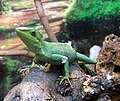Laemanctus
| Laemanctus | |
|---|---|

| |
| Laemanctus longipes, eastern casquehead iguana | |
| Scientific classification | |
| Domain: | Eukaryota |
| Kingdom: | Animalia |
| Phylum: | Chordata |
| Class: | Reptilia |
| Order: | Squamata |
| Suborder: | Iguania |
| Family: | Corytophanidae |
| Genus: | Laemanctus Wiegmann, 1834 |
| Species | |
|
4, see text. | |
Laemanctus is a genus of lizards in the family Corytophanidae. Species in the genus Laemanctus are commonly referred to as conehead lizards or casquehead iguanas. The genus is endemic to Central America.[1]
Description
[edit]Lizards of the genus Laemanctus exhibit the following characters. The tympanum is distinct. The plane of the top of the head slopes forward, and the occipital region is raised and extends beyond the occiput. The body is laterally compressed, and is covered with imbricate keeled scales. A strong transverse gular fold is present, but a gular pouch is absent. The limbs are very long, and the infradigital lamellae have a median tubercle-like keel. Femoral pores are absent. The tail is very long, and is round in cross section. The lateral teeth are tricuspid, and pterygoid teeth are present. The clavicle is loop-shaped proximally. A sternal fontanelle is absent. Abdominal ribs are absent.[2]
Species and subspecies
[edit]The genus Laemanctus consists of four species which are recognized as being valid. Two of these species have recognized subspecies.[3]
| Image | Scientific name | Common Name | Subspecies | Distribution |
|---|---|---|---|---|
 |
Laemanctus julioi McCranie, 2018 | Julio's casquehead iguana | Honduras | |
 |
Laemanctus longipes Wiegmann, 1834 | eastern casquehead iguana |
|
Mexico and Central America. |
 |
Laemanctus serratus Cope, 1864 | serrated casquehead iguana |
|
southeastern Mexico and Central America. |
| Laemanctus waltersi Schmidt, 1933 | Walters’ casquehead iguana | Honduras. |
References
[edit]- ^ Goin CJ, Goin OB, Zug GR (1978). Introduction to Herpetology, Third Edition. San Francisco: W.H. Freeman. xi + 378 pp. ISBN 0-7167-0020-4. (Laemanctus, p. 291).
- ^ Boulenger GA (1885). Catalogue of the Lizards in the British Museum (Natural History). Second Edition. Volume II. Iguanidæ ... London: Trustees of the British Museum (Natural History). (Taylor and Francis, printers). xiii + 497 pp. + Plates I-XXIV. (Genus Læmanctus, p. 104).
- ^ Genus Laemanctus at The Reptile Database. www.reptile-database.org.
Further reading
[edit]- McCoy CJ (1968). "A review of the genus Laemanctus (Reptilia, Iguanidae)". Copeia 1968 (4): 665–678.
- McCranie JR (2018). "The Lizards, Crocodiles, and Turtles of Honduras. Systematics, Distribution, and Conservation". Bulletin of the Museum of Comparative Zoology 15 (1): 1–129.
- Wiegmann AFA (1834). Herpetologia Mexicana, seu Descriptio Amphibiorum Novae Hispaniae, quae Itineribus Comitis de Sack, Ferdinandi Deppe et Chr. Guil. Schiede in Museum Berolinense Pervenerunt. Pars Prima, Saurorum Species Amplectens. Adiecto Systematis Saurorum Prodromo, Additisque Multis in hunc Amphibiorum Ordinem Observationibus. Berlin: C.G. Lüderitz. vi + 54 pp. + Plates I-X. (Laemanctus, new genus, pp. 45–46). (in Latin).
